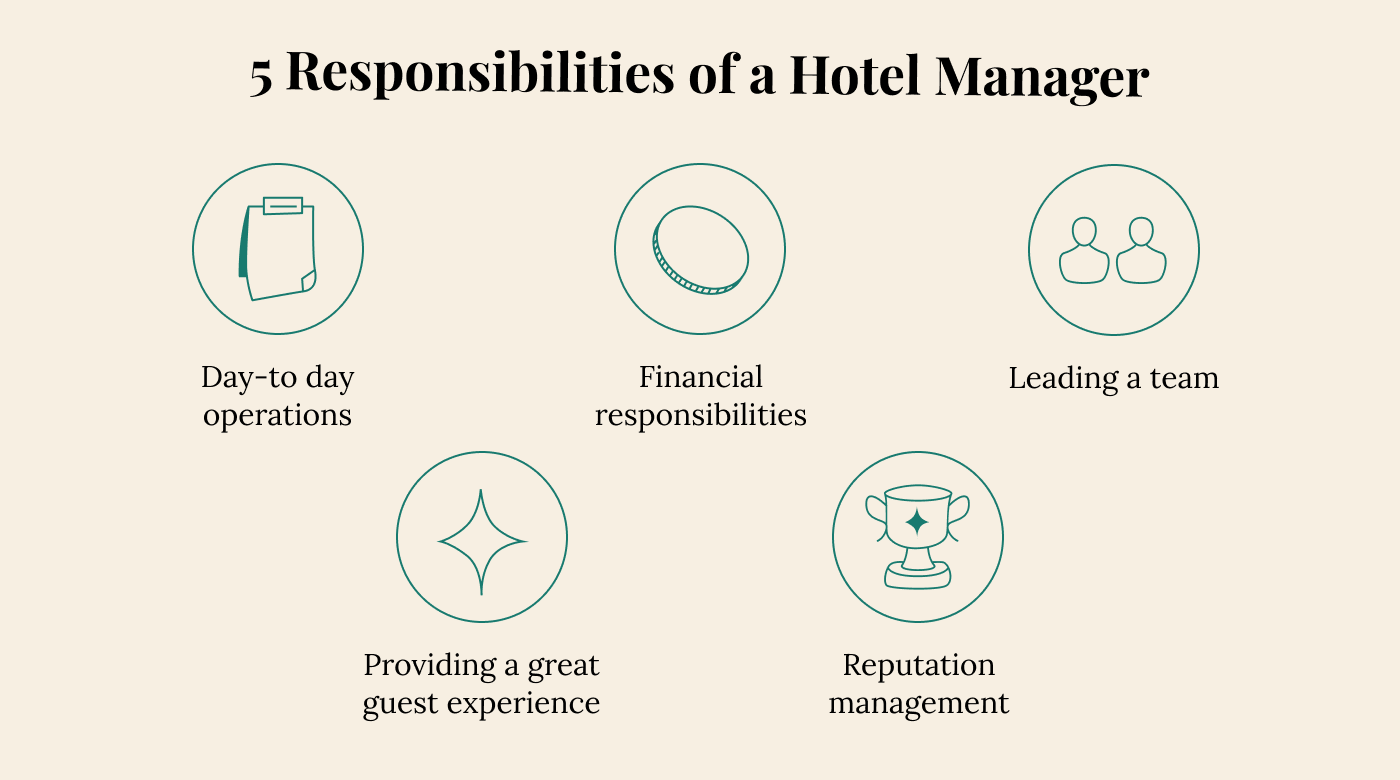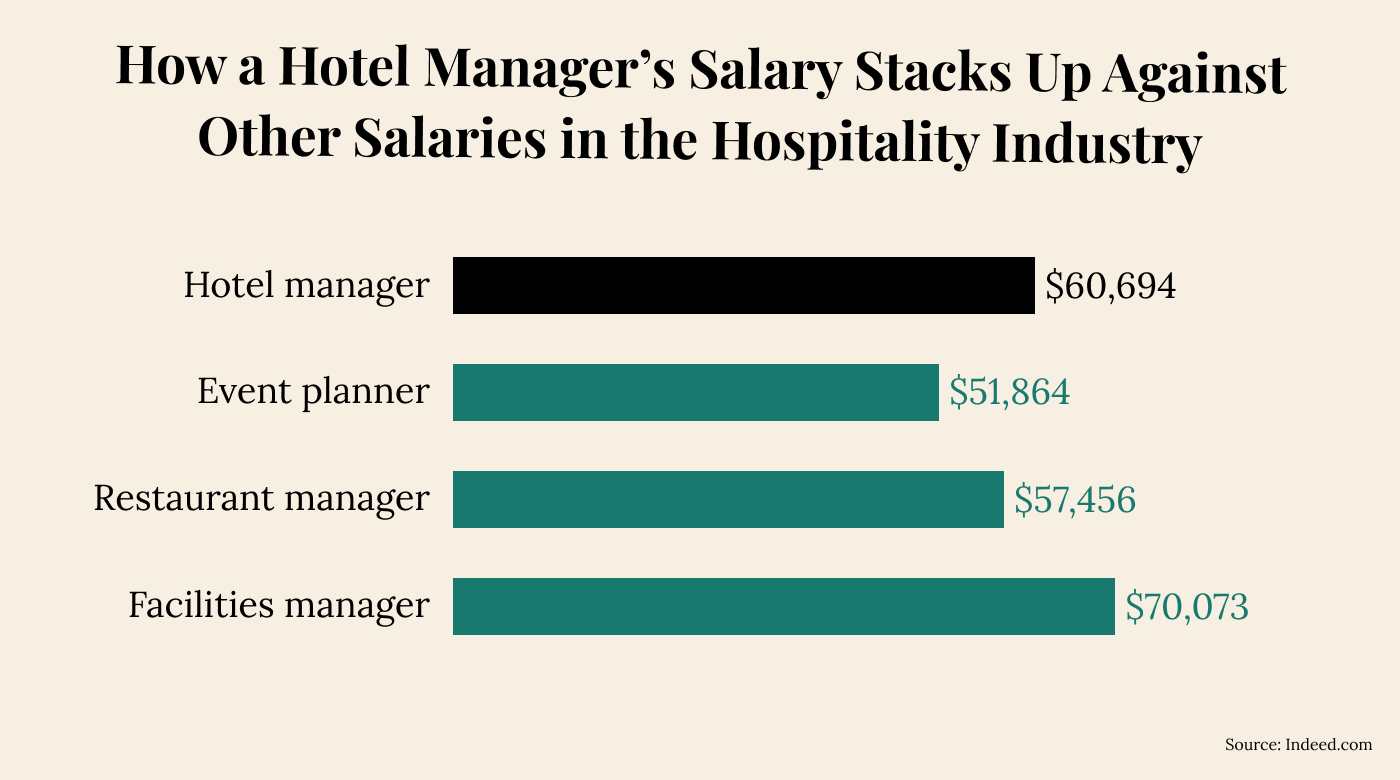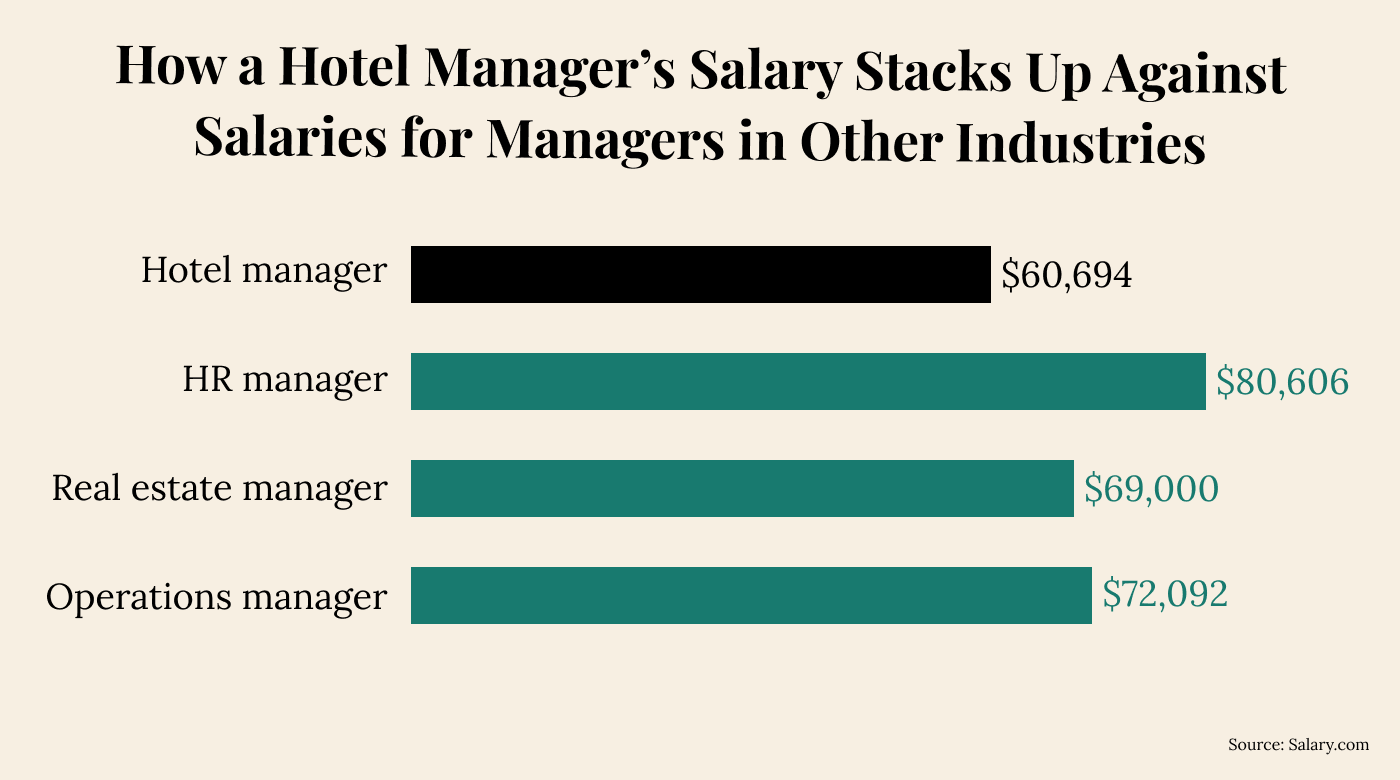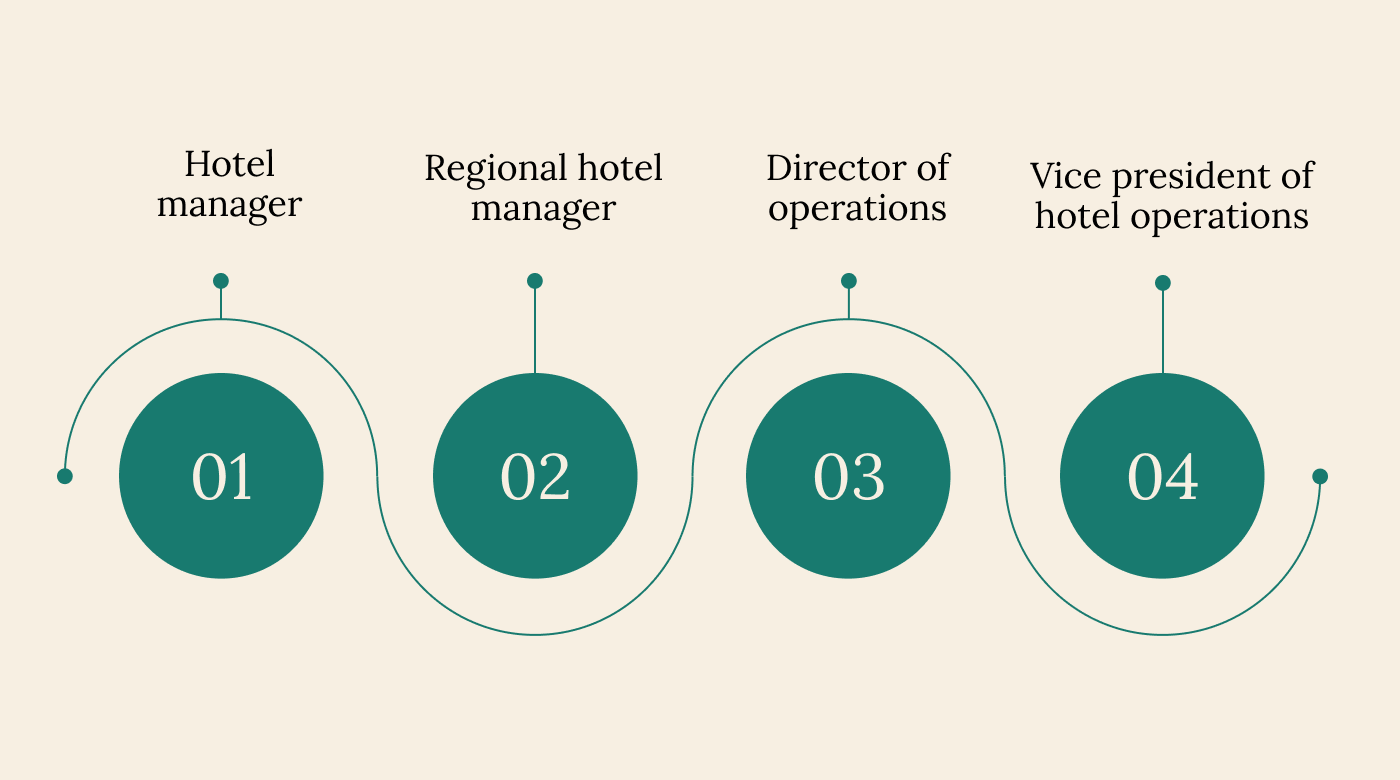If you’re here because you want the inside scoop on hotel manager salaries, you’re in luck!
In this article, I’ll cover everything related to a hotel manager’s salary, from the factors that influence the amount on their paycheck, how the pay compares to different industries and other hospitality management positions, and the benefits and perks beyond the base salary.
Let’s dive in!
What Does a Hotel Manager Do?
With the Bureau of Labor Statistics forecasting 18% growth for hotel manager jobs in the U.S. by 2031, it’s important to understand their role in the hospitality industry.
These professionals are the unsung heroes who make the hospitality magic happen behind the scenes.
So what exactly do hotel managers do to keep businesses humming?

Day-to-day operations
At the heart of a hotel manager’s role is making sure the hotel and its staff provide consistent and high-quality customer service throughout guests’ stays.
Hotel managers ensure all tasks and activities related to hotel operations and guest experiences are running smoothly. This encompasses everything from overseeing guest check-ins and evaluating staff performance to hiring a new front desk manager.
Hotel managers must also anticipate and address any issues that arise, as well as handle guest inquiries or complaints. High emotional intelligence goes a long way in helping them navigate different situations and emergencies.
Financial responsibilities
Hotel managers need to know their numbers. They’re essentially the financial backbone of the hotel, managing budgets, planning financial strategies, and controlling costs. It’s their job to analyze revenue streams, monitor expenses, and make decisions that optimize financial performance.
They also collaborate with different departments to ensure that financial objectives are met, negotiate contracts with suppliers, and explore opportunities for revenue growth. For example, they might identify new markets to target to increase bookings or implement revenue management strategies to maximize revenue potential during peak seasons.
Leading a team
Hotel managers aren’t just managers—they have to be leaders, too. Having a unified and functioning team is one of your biggest assets in the hospitality industry—or any industry, for that matter.
Hotel managers have the important task of training and motivating their teams to deliver exceptional service. They ensure team members have the skills and knowledge to succeed, and provide the guidance and support they need to grow.
The best hotel managers lead by example, demonstrating professionalism, integrity, and a strong work ethic. They create an environment where success is the norm, inspiring their teams to thrive.
Providing a great guest experience
Guest satisfaction reigns supreme in the hospitality world, so good hotel managers know how to curate extraordinary and memorable experiences.
A day in the life of a hotel manager involves proactively finding ways to enhance the overall guest experience.
An environment where guests feel valued and cared for leaves a lasting impression on them that keeps them returning time and time again.
Managing the hotel’s reputation
In an age where Google and Yelp reviews hold tremendous power, a hotel’s reputation can make or break its success.
Hotel managers monitor guest reviews and ensure they’re addressed promptly and professionally. They must also be adept at crisis management in the event of particularly challenging situations.
Moreover, hotel managers take proactive measures to maintain a positive online presence. They work with marketing teams on social media platforms, review websites, and online community forums to show the hotel’s strengths and engage with potential guests.
The manager’s role is to safeguard the hotel’s image, build trust among guests, and strengthen its market standing, all of which contribute to the hotel’s long-term success.
How Much Does a Hotel Manager Make?
As of July 10, 2023, the average base salary for a hotel manager in the United States stands at $60,694. In Canada, the average salary is 54,772 CAD, and in the UK, it’s £36,311.
Starting salary of an entry-level hotel manager
But what if you’re just starting out in the industry?
For a hospitality management graduate with less than a year of experience, you’re typically looking at an annual salary of $38,135 for a hotel manager position.
Alternatively, you might begin as an assistant hotel manager—a position with an average salary of $46,275. As an assistant hotel manager, you may work your way up to a higher salary as you gain experience and take on more responsibilities.
Hotel manager vs other hospitality roles
The hospitality industry is a vast playground, with many other career options beyond hotel management.
Let’s take a look at four other hospitality careers in management that are expected to keep growing until at least 2031.

1. Event planner
Event planners organize and execute gatherings and events, including conferences, weddings, and trade shows. They coordinate all the logistics, from venue selection to vendor coordination, all while ensuring a seamless flow of events.
This career offers promising financial prospects. The average salary of an event planner is $51,864, but the profession itself is projected to experience a remarkable 18% growth rate from 2021 to 2031—nearly twice as fast as the growth rate of many other professions.
The industry’s growth is due to the increasing value of events in promoting brands and building customer relationships, as well as the greater demand for immersive and engaging experiences.
2. Restaurant manager
What’s behind a successful restaurant?
A restaurant manager keeps the often chaotic, behind-the-scenes food service running. They take charge of day-to-day restaurant operations, overseeing customer service, staff management, inventory control, and financial management.
On average, a restaurant manager earns $57,456 per year, and the industry also has an above-average growth rate of 10%. This rate reflects the greater demand for dining experiences, the rise in food delivery services, and restaurant-goers’ increased appetite for culinary innovation.
3. Facilities manager
Facilities managers keep the hospitality infrastructure in top shape. They’re in charge of maintenance, repairs, security, and safety protocols of hospitality establishments.
Facilities managers bring in $70,073 a year, on average, and have promising earning potential in the industry. The field is projected to experience a solid 7% growth rate between 2021 and 2031.
4. Marketing manager
At the forefront of business growth in the hospitality industry are marketing managers. These professionals develop strategies to promote businesses, increase brand awareness, and attract customers. Their job includes conducting market research, planning advertising campaigns, managing the business’s online presence, and analyzing consumer trends.
These professionals have an average annual salary of $73,961, and they’re in high demand as more companies recognize the positive impact of marketing. This surge in demand is driving the 10% growth rate expected in the industry.
Hotel manager vs. managerial positions in other industries
Let’s take a quick look at the compensation for managers in other sectors. By doing so, we can gain a broader perspective on how hotel managers’ earnings stack up against their counterparts in other fields.
HR manager
HR managers make an average of $80,606 a year. They handle the human resources functions within an organization, including recruitment, employee relations, performance management, and benefits administration.
Real estate manager
Real estate managers get paid an average of $69,000 to oversee the operational and financial aspects of properties, such as property leasing, maintenance, tenant relations, and property valuation.
Operations manager
Operations managers take care of organizations by optimizing processes, logistics, and quality control. They earn an average of $72,092 annually to ensure the overall efficiency and success of an organization.

5 Factors That Affect a Hotel Manager’s Salary
Several factors affect a hotel manager’s salary. Understanding them will help you gauge these professionals’ earning potential and how they can optimize their compensation.
Experience
As in most industries, the more experience you have, the more you get paid—and rightfully so. Hotel managers who have spent years honing their skills and navigating the industry will have higher salaries due to their accumulated knowledge and expertise.
Their understanding of the industry’s nuances is only gained through firsthand experience and is, therefore, very valuable for employers. Hotel managers who have a track record of success can demand a higher salary, as they bring a proven ability to drive profitability.
So, to maximize your earning potential, gaining more hotel management experience is the way to go. Consider seeking opportunities for growth within your current hotel or exploring roles in higher-end establishments.
Education
While real-world experience is important in the hotel industry, having a bachelor’s or master’s degree in hospitality management or related fields translates to a strong foundation of knowledge and skills.
Obtaining certifications like Certified Hotel Administrator (CHA) or Certified Hospitality Supervisor (CHS) shows that hotel managers are good at what they do. This makes them more marketable.
Managers with advanced degrees and certifications are seen as more qualified and capable, which makes them attractive candidates for higher-paying jobs. Investing time in education and earning certifications positions you for a higher salary and more career advancement opportunities.
Hotel size and class
Think about the difference between managing a luxury hotel and a budget chain.
A hotel’s size and class directly influence its pricing—and, consequently, the manager’s earning potential.
Larger hotel chains can offer higher salaries because they make a lot more revenue per room than budget hotels do. Yet, with a bigger paycheck can also come a longer list of demands and responsibilities. This might mean dealing with more finicky customers, working longer hours, or providing a higher level of service.
A small boutique hotel, on the other hand, is a smaller and simpler environment. With fewer responsibilities a small boutique hotel manager.would likely earn a lower salary than they could with a national or international hotel brand.
Location
Location is the golden ticket for hotels and hotel managers. Guests are willing to pay a premium to stay in the center of New York City rather than the suburbs of New Jersey. This means location directly impacts the hotel’s revenue—and, in turn, the hotel manager’s salary.
According to a cheaphotels.com survey, the cheapest available double room at a 3-star hotel in major US cities like New York costs $240, and $181 in Los Angeles. In contrast, smaller cities like Omaha offer the same for $107.
Hotel managers working in urban areas and popular tourist destinations have higher salaries to match the higher living costs and demand for skilled management. Hotel managers in remote or less busy areas may have to contend with lower salaries.
So, when considering salary expectations, always think about regional factors and the overall cost of living in the area where you plan to work.
Performance
Your performance has a big impact on your pay. Hotel managers who show exceptional performance and meet or exceed their KPIs are more likely to receive salary increases, performance bonuses, and other forms of recognition.
If you have a proven track record of success with previous hotels, you have more chips to bargain with when negotiating your salary.
A good tip is to gather relevant data, such as Revenue per Available Room (RevPAR), from during your time as a hotel manager. Alternatively, you can present customer reviews on Tripadvisor that show the positive impact of your management on guest experiences.
3 Hospitality Industry Trends That Can Impact Your Earning Potential As a Hotel Manager
As a hotel manager, when your hotel does well financially, you do, too.
Here are some of the biggest trends in the hospitality industry that stand to impact your hotel’s profitability—and your earning potential as a hotel manager.
1. Sustainability practices
“Sustainability” has been a buzzword for years, and the hospitality industry is no exception. Eco-friendly initiatives, such as energy conservation, waste reduction, and green certifications, are all the rage.
As the global push for sustainability continues, good hotel managers know they need to adapt to stay competitive and meet their guests’ demands. Managers who can implement and manage sustainable practices often get higher salaries because hotels see the value of eco-conscious strategies in attracting environmentally conscious guests.
Here are some ways to help you get started:
- Do a sustainability audit: look at your hotel’s current practices to see if there are areas that could use eco-friendly initiatives, such as energy usage, water consumption, or waste management.
- Set measurable goals: set achievable sustainability goals for your hotel, be it reducing energy consumption by a certain percentage or increasing recycling rates. Having clear objectives will guide your efforts.
- Educate your staff: sustainability isn’t a one-man job. Train your staff on eco-friendly practices, encourage them to make suggestions, and reward sustainability contributions.
- Invest in green technologies: explore energy-efficient lighting, water-saving fixtures, and smart heating and cooling systems. The initial costs may be steep, but the long-term savings and positive environmental impact are worth it.
- Source locally and ethically: partner with local food and amenities suppliers. Supporting local businesses reduces transportation-related emissions and builds a sense of community.
- Obtain green certifications: look into sustainability certifications, like LEED or Green Globe. Having them enhances your hotel’s reputation and attracts eco-conscious guests.
- Communicate with guests: share your sustainability efforts through marketing materials, website updates, and in-room literature.
- Track and measure progress: track your sustainability initiatives’ performance regularly, and adjust your strategies as needed.
2. Rise of experiential travel
The modern hotel guest needs more than just a place to sleep; they want a memorable experience.
For hotel managers, staying ahead of this trend is crucial. Those who organize, personalize, and provide excellent customer service can make more money by meeting the need for experiential traveling.
This calls for thinking outside the box and prioritizing guest-centric approaches, such as the following:
- Personalized guest services: offer services tailored to each guest’s preferences and needs with welcome amenities, customized dining experiences, or activity recommendations.
- Themed events: organize special events, like wine tastings, cultural showcases, or outdoor adventures, that resonate with your target audience.
- Going local: provide opportunities for guests to immerse themselves in the local culture through guided tours, workshops, or partnerships with local businesses.
- Wellness and mindfulness: spa retreats, meditation sessions, or yoga classes can promote a holistic guest experience and are especially attractive to health-conscious travelers.
- Integrating technology: invest in virtual reality for interactive tours, mobile apps for seamless guest interactions, or in-room smart devices for personalized services and entertainment.
3. Technological proficiency
Technology is the name of the game in the hospitality industry. Hotels that are embracing technology to enhance guest experiences are reaping the benefits, and skilled hotel managers play a crucial role in that transformation.
A hotel manager’s proficiency in revenue management systems, guest relationship management software, data analytics, and online marketing gives their hotels a competitive edge in the market.
If it sounds complicated, don’t fret—just bring in the experts. Investing in consultants or professionals to streamline the digital experience for customers is a smart move, as it not only improves guest satisfaction but also potentially boosts your hotel’s revenue and earning potential.
Hotel managers who stay ahead in the digital landscape are the ones who’ll thrive in the dynamic hospitality world.
Growth Opportunities for a Hotel Manager
Starting salary is important when looking for a job as a hotel manager, but the potential for salary growth is another key factor to consider if you're considering if you want to become a hotel manager.
As hotel managers gain experience and progress in their careers, they often see salary increases and more earning opportunities.
Career progression
The journey through the hotel management career usually starts with an entry-level position, where the manager lays the foundation for their skills and knowledge in hotel management. Year by year, as they prove their abilities, they become eligible for promotions, which bring about more responsibilities and higher compensation packages.
These promotions can lead to two different paths: higher-level management positions or new opportunities in different sectors of the hospitality industry. For instance, you can become a regional hotel manager, the director of operations, or even the vice president of hotel operations.

New opportunities within different departments can also lead to salary growth and career advancement. Gaining experience in different hotel operations makes them an asset to the hotel.
By planning out your career path beforehand, you can strategically maximize your earning potential.
Professional development
Hotel managers can also invest in continuous professional development, such as workshops, seminars, and industry conferences. It’s always a good idea to stay updated on the latest trends and best practices.
Acquiring new skills and certifications improves a hotel manager’s chances of climbing the career ladder quickly. For example, certifications in revenue management or guest experience can set them apart as specialists in certain areas.
Networking
An often overlooked strategy for career growth is building a strong network within the hospitality industry. Networking with peers, mentors, and other industry professionals can open doors to new opportunities. These new connections can help hotel managers explore roles in different hotel chains or even transition to roles in other related industries.
Through networking, hotel managers can gain access to insider information about job openings, salary trends, and negotiation strategies. Being well-connected increases your chance of being considered for high-paying positions and lucrative projects.
Benefits and Perks: Beyond the Base Salary
On top of their base salary, hotel managers have the opportunity to earn benefits and other perks, as well as take advantage of incentives.
Performance-based bonuses
Bonuses are based on performance metrics like revenue generation, occupancy rates, guest satisfaction scores, cost control, and departmental profitability. So, if the hotel manager does a great job in these aspects, they can get a big bonus on top of their regular salary.
This performance-based reward system motivates managers to excel in their contributions to the hotel’s growth and profitability.
Employee discounts
While employee discounts don’t contribute to their paycheck, who doesn’t love some extra perks?
As part of employee discount programs, hotel managers often receive special rates and benefits, such as discounted rates for hotel stays, dining, spa services, and other amenities within the hotel or hotel chain. These exclusive perks offer them the chance to experience the hotel’s amenities firsthand and enjoy some well-deserved relaxation.
More than just a discount, employee benefits also demonstrate the company’s gratitude for their managers’ hard work and dedication. They’re a win-win situation that leads to a positive work environment, enhances employee well-being, and strengthens the bonds between managers and other hotel employees.
Travel and accommodation stipend
Another juicy perk many hotel managers get is a travel and accommodation stipend, which covers the costs of business trips and lodging.
When hotel managers need to travel for work, they get a stipend for their travel and accommodation.
This stipend allows managers to focus on their responsibilities without worrying about the trip’s out-of-pocket costs. It’s just one more way hotels show appreciation for their dedicated managers.
Conclusion
There you have it—everything you need to know about a hotel manager’s role, responsibilities, and salary. One thing is clear: the hospitality industry is rich with opportunities and rewards for those willing to work for them.
Understanding the industry trends and factors that influence hotel manager salaries can help you chart your course toward a lucrative, fulfilling career in hospitality.
Subscribe to our newsletter for the latest articles, podcasts, how-to guides, tool reviews, and product exclusives to stay in the loop about all things hotel management.



